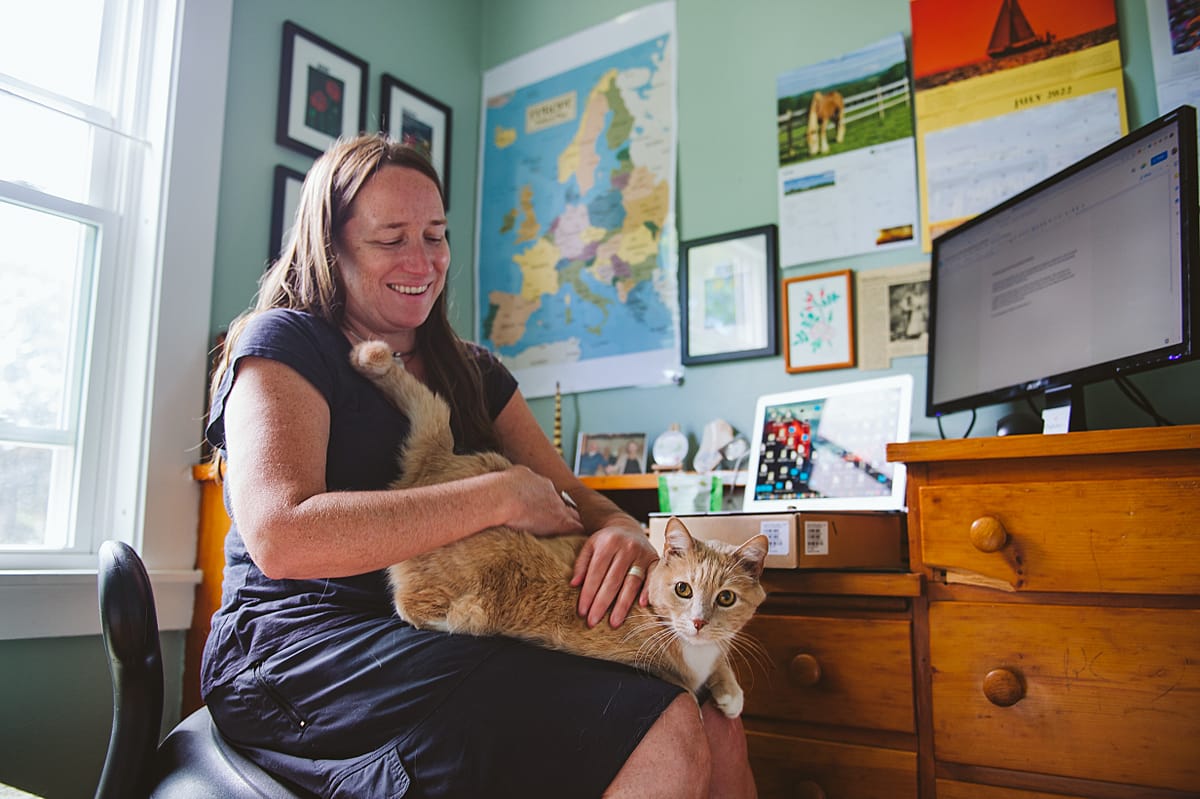“I think I’ve always had a strong sense of right and wrong and felt like I wanted to dedicate my time on this planet to making things better. Whatever that looks like, and wherever I can contribute my skills.” ~ Hannah Murray

RAN wanted to give funding to grassroots activists and organizations based in Patagonia working to combat deforestation. Would she be interested in traveling there and helping them identify candidates? Murray immediately said yes. But before she started this project, she traveled back to the U.S. to pick up her 12-year-old companion cat, Peanut. Then the two of them set off for Argentina in the austral spring, traveling by plane, bus, and car across Patagonia.
“I was sent down there with a handful of names,” Murray, 48, told the Unbound Project.
“I traveled from the northern part of Patagonia and worked my way down to the southern tip of South America. I met with all the groups and then worked with them to help them present what their funding needs were to the foundations. And they all got funding!”
Two days before she was scheduled to leave South America, Murray landed in a town called Punta Arenas in the southern part of Patagonia, Chile. She was there to meet with the last contact on her list — an occupational safety manager-cum-environmental activist named Nelson Sanchez Oyarzo. He’d later become her husband.
Besides helping her find her life partner, Murray’s time in Patagonia led her to the work she does now as grant specialist. Her most recent appointment was with the Humane League, a U.S.-based NGO, where she managed a multimillion dollar grant program for the Open Wing Alliance (OWA), a coalition of groups working to end the abuse of chickens in factory farms. During her three years and three months at OWA, Murray helped about 50 animal welfare organizations receive funding that would allow them to flourish.
“I love being able to connect people with resources to people who are in need of those resources. I focus on really listening to the grantees and trying to hear what they’re communicating — what their hopes and dreams are, what they need, what would make their lives easier.”

A key component of Murray’s work has also been the implementation of trust-based funding principles that incorporate multiyear funding. This type of funding has helped groups receive the resources they need without jumping through unnecessary hoops or needing to undergo tedious administrative processes that can reduce time with their charitable work.
“I feel like all my experience being a grant seeker has made me more sensitive to just the power dynamic issues. Because there are power dynamics — you’ve got someone who’s sitting on the money and someone who needs money.”
Murray says she developed an interest for animal welfare back when she was about eight years old and had gone fishing with her family.
“I just remember the fish flopping around in the bucket afterwards, and I thought, ‘That suffering is not necessary,’” she said. “It was very upsetting to me and I stopped eating fish immediately. It just made me feel sick.”
Once, when she was outside of a circus, she also encountered a group of protesters who helped her “see animals in a different way, instead of just as entertainment.”
“I’ve had a decades-long career in activism and people are always like, ‘Do you really think you can change people just standing around with signs outside? And I’m like, ‘Yes, you can!’” Murray said with a laugh. “I have been changed by several signs at different points in my life.”
Being a grant specialist isn’t the only hat Murray has worn. She’s also a forestry expert with a master’s degree in forestry from Yale. She’s a skilled cook who once ran a food business in Punta Arenas, Chile, selling vegan burgers, falafel and mayo to non-vegan sheep ranchers. She’s also fluent in several languages, including Spanish and Portuguese.
“I don’t have a very linear career trajectory, but I’m OK with that,” Murray said. “I’ve just followed what I’ve been interested in.”
But whatever she’s done, Murray has made sure her work is helping nonhuman animals, the environment, or underrepresented peoples.
“I think I’ve always had a strong sense of right and wrong and felt like I wanted to dedicate my time on this planet to making things better. Whatever that looks like, and wherever I can contribute my skills.”

After spending many years in Patagonia as well as California, Murray and her husband moved to Rockland, Maine, in 2018, with their two rescue cats, Tomasito and Emily Noelia.
“It felt like Patagonia in a way,” Murray said. “Obviously, the landscapes are different but you have this rocky coast [in Maine], you have lots of forests, and you’ve got lots of areas to go hiking.”
While she and her husband feel very settled in Maine, Murray keeps a photograph of a car cruising down an unpaved road towards the Cerro Fitz Roy mountains in Argentine Patagonia — the very mountains that became the logo for outdoor clothing company Patagonia.
“I just like remembering that there’s always an open road ahead, even if you get bogged down by your work. It just reminds me that life can be anything.”
Written by Elizabeth Claire Alberts
Photographs by Victoria de Martigny






